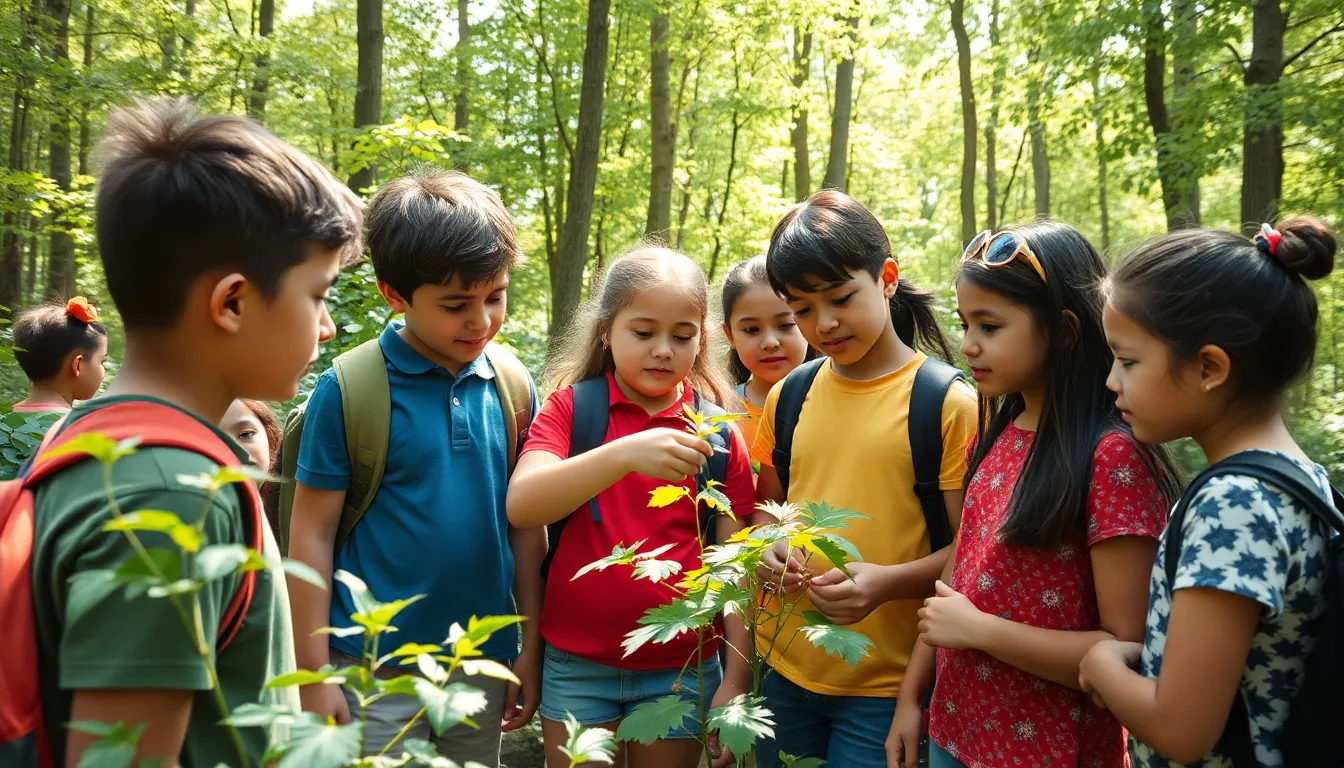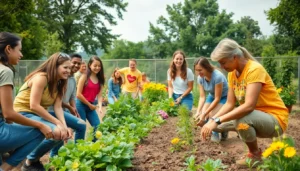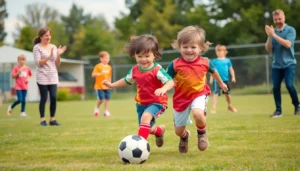Table of Contents
ToggleImagine a classroom where the walls are made of trees and the ceiling is the sky. Outdoor learning transforms traditional education into an adventure, where students explore nature’s wonders while soaking up knowledge. It’s not just about swapping desks for picnic blankets; it’s about sparking curiosity and igniting a passion for discovery.
Overview of Outdoor Learning
Outdoor learning changes traditional education into hands-on experiences. This method enhances students’ engagement while connecting them with nature.
Definition and Importance
Outdoor learning refers to educational activities that take place outside the classroom. It promotes exploration and discovery in natural settings, encouraging students to observe and interact with their environment. Such experiences motivate curiosity and enhance creativity. Engaging with nature enriches knowledge retention and builds essential life skills. Outdoor learning also supports social development through teamwork and communication. Research shows that students exposed to this methodology demonstrate improved academic performance and develop a greater appreciation for the environment.
Historical Context
Outdoor learning has roots in early education philosophies. In the 1800s, educators like Friedrich Froebel emphasized nature’s role in learning, promoting outdoor play. The advent of the progressive education movement in the early 20th century further advocated for experiential learning. By the late 20th century, modern outdoor education programs emerged, emphasizing environmental awareness and stewardship. Influential figures, such as David Sobel, have highlighted the importance of place-based education, connecting students to their communities. Today, outdoor learning is recognized as essential in fostering holistic development in students.
Benefits of Outdoor Learning

Outdoor learning offers numerous advantages that positively impact students’ educational experiences. Engaging with nature enhances key developmental areas, contributing to well-rounded growth.
Cognitive Development
Cognitive development thrives in outdoor learning environments. Students exposed to varied natural settings demonstrate improved problem-solving skills. Engaging with the surroundings stimulates creative thinking and observation. Researchers found that outdoor experiences can boost attention spans by 20%. An increase in physical activity correlates with higher academic performance in subjects like science and math. Exploration fosters curiosity, allowing students to make real-world connections that deepen understanding. Knowledge retention improves when lessons take place outside, as nature provides a dynamic backdrop for learning.
Social Skills Enhancement
Social skills flourish through outdoor learning experiences. Collaboration occurs naturally during group activities, encouraging teamwork among peers. Students develop communication skills as they navigate challenges together. Outdoor settings promote relationship building, allowing friendships to form through shared experiences. Studies show that participation in outdoor education leads to increased self-confidence and leadership skills. Active engagement in such environments teaches empathy and fosters respect for others. Learning outdoors enhances social awareness, preparing students for diverse interactions in various settings.
Outdoor Learning Environments
Outdoor learning environments encompass various settings where education takes place outside traditional classrooms. These environments promote hands-on experiences with nature and community resources.
Nature-Based Learning
Nature-based learning utilizes natural surroundings to facilitate educational experiences. Students engage with ecosystems, observing plants and animals in their habitats. Such interactions foster environmental stewardship. Research shows that students in nature settings demonstrate heightened curiosity and critical thinking skills. Immersive experiences enhance retention of knowledge across subjects like science and geography. Teachers can incorporate activities like outdoor science experiments or guided nature walks, which deepen understanding and connections to the world. Nature-based learning not only enriches academic experiences but also nurtures a sense of belonging in the natural environment.
Urban Outdoor Learning Spaces
Urban outdoor learning spaces integrate educational opportunities within city settings. These spaces include parks, gardens, and community centers that provide unique learning experiences. Students can explore urban ecosystems and engage in initiatives like community gardening or environmental activism. Research indicates that urban outdoor learning enhances social skills and cultural awareness among students, as they collaborate with diverse peers. These environments promote active learning, enabling students to apply classroom knowledge in real-world contexts. Accessible outdoor areas in urban settings help counterbalance the effects of limited green spaces, contributing positively to students’ academic and social development.
Implementing Outdoor Learning
Outdoor learning requires thoughtful integration into existing curricula and proper training for educators. This ensures effective implementation and maximizes student benefits.
Curriculum Integration
Curriculum integration involves embedding outdoor learning into various subjects. Science lessons might incorporate outdoor experiments, while mathematics could use real-world measurements in nature. Social studies can focus on local ecosystems or community gardens. Teachers encourage hands-on experiences that stimulate critical thinking and engagement. The interdisciplinary approach promotes holistic learning, connecting classroom theories to observable phenomena in nature. Schools might also develop specific programs that align with state standards while providing students with outdoor exploration opportunities. This strategy not only enhances academic performance but also fosters a passion for lifelong learning.
Teacher Training and Support
Teacher training requires a focus on outdoor education strategies and methodologies. Professional development programs can equip educators with skills to facilitate lessons in nature. Workshops might include guidance on safety protocols, lesson planning, and managing outdoor classroom dynamics. Support networks and mentorships enable teachers to share best practices and experiences. Collaboration among educators fosters a sense of community and encourages innovative approaches. Regular feedback and assessment enhance teaching effectiveness, ensuring that outdoor learning experiences remain engaging. By prioritizing teacher support, schools can create a sustainable outdoor learning environment that benefits both students and educators.
Challenges and Considerations
Outdoor learning presents various challenges and key considerations that educators and institutions must address. Prioritizing safety and accessibility ensures an effective learning environment for all students.
Safety Concerns
Safety concerns rank high in outdoor learning environments. Hazards such as uneven terrain, wildlife encounters, and weather conditions demand careful planning. Personal protective equipment, like helmets and gloves, plays a crucial role in mitigating risks during activities. Supervising adults must be capable of responding to emergencies, ensuring that first aid kits are accessible. Educators often benefit from conducting thorough risk assessments before embarking on outdoor excursions. Training staff in safety protocols and emergency procedures enhances student protection, fostering a secure learning atmosphere.
Accessibility Issues
Accessibility issues pose significant challenges for inclusive outdoor learning experiences. Natural environments may not accommodate all students, particularly those with mobility impairments or sensory sensitivities. Ensuring access often requires specific adaptations, such as wheelchair-friendly pathways and sensory gardens. Educators must collaborate with specialists to design lessons that engage every student, regardless of ability. By actively seeking input from the community, schools promote inclusive practices that celebrate diversity. Implementing sensory tools and assistive technology further enhances learning outcomes for all participants.
Outdoor learning offers a unique opportunity to enrich educational experiences by connecting students with nature. This approach not only enhances academic performance but also fosters essential social skills and personal growth. By engaging in hands-on activities outside the classroom, students develop a deeper appreciation for the environment and improve their problem-solving abilities.
As schools integrate outdoor learning into their curricula, they create dynamic and inclusive environments that cater to diverse learners. With proper training and thoughtful planning, educators can overcome challenges and ensure that outdoor learning is safe and accessible for everyone. Embracing this transformative method paves the way for a brighter future in education, where curiosity and exploration thrive.






